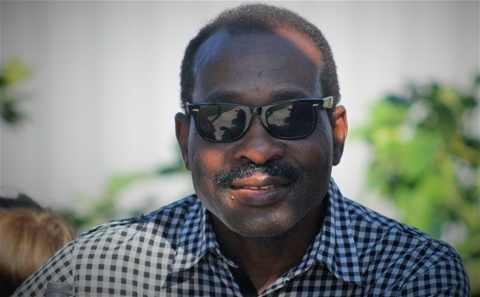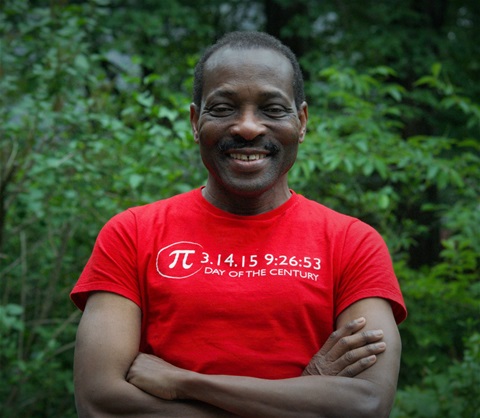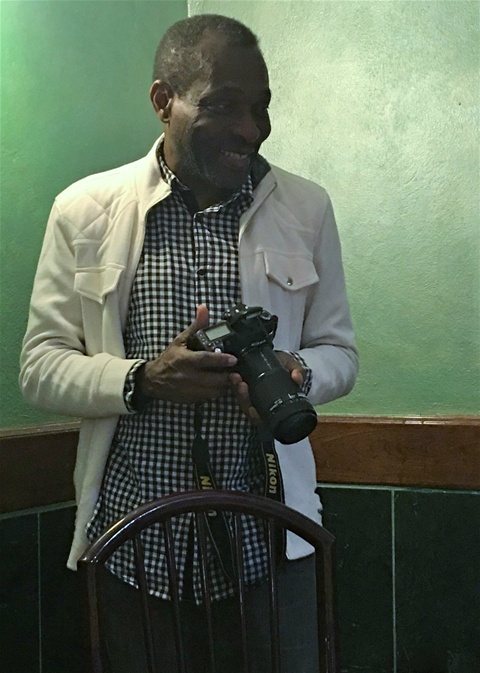Reflections of An Old Fart
Earlier this year, I was sitting at a bar in Saratoga Springs, New York, with a glass of wine in one hand and a notebook in the other, reflecting on the events of my busy day. Out of my peripheral vision, I noticed a woman pull up a chair next to me and sit down. She said hello with a welcoming smile as I turned to give her my full attention. She was a slim, attractive brunette in her early thirties with a stunning face. Being somewhat partial to good-looking women, I could feel a degree of excitement as she created conversations on many different topics. Our chit-chat continued for a while, with no particular theme rising to the surface until she asked me how old I was. I answered, "I am sixty-eight years old."
She responded, "No way!" Other people had underestimated my age before, so I was not completely surprised by her reaction. So, I calmly reiterated my age. But she became even more excited, "I don't believe you. Show me your driver's license." I reached for my wallet, pulled out my California driver's license, and handed it over. She looked at my date of birth, calculated my age, then screamed, "Oh my god, you are an old fart." She handed back my license, got up, and left. As she moved away, I wondered what she planned to do with me that was no longer viable now that she knew I was sixty-eight years old. I should have asked her, but I was shocked and missed the opportunity.
I decided to embrace my new old fart status and take advantage of the benefits my new group could provide. It feels good to know that I look younger than my age and enjoy the discounts I get as a senior citizen, but something catches me off guard every once in a while. A woman got up and offered me her seat on a crowded subway in Manhattan earlier this year, but I would not accept it. She insisted, but I was adamant that I did need it. During this interaction, my pride took control. If I took her seat, I would have to admit, at least to myself, that I was an old and tired-looking senior. If I did not, I would feel too proud to face reality. I was completely confused since I was brought up to believe that men should offer their seats to women and older adults. But, not once did I learn that a man should accept a place from a woman. We finally split the difference and shared the seat.
These days, I am living with the question of how someone ages gracefully. Age crept up on me when I was busy living. I still feel like 30 years old and act like it very often, but ever so often, someone will come to me for grandfatherly advice and pop my bubble. So, I decided to embrace the fact that I am an old fart and get the most out of that distinction.
I want to share my reflections on my sixty-eight-year journey with you. How did I get here? What did I learn along the way? Where and why do I feel pain and regret? Where and why do I feel joy? I will start this conversation by sharing my first memory and then introduce you to my mother and father.
My First Memory
Hurricane Charlie hit Jamaica on August 17, 1951, with winds near one hundred and twenty-nine miles per hour. Charley killed approximately One hundred and fifty-four (154) persons and left about twenty thousand (20,000) homeless. There was immense damage to buildings, roads, and other infrastructure. The estimated loss was sixteen million pounds (£16,000,000).
It was during this catastrophe that I first realized that I was alive. I heard my mother, Griselda Appleby, call out to my cousin, Kenneth Rodgers, "Put the baby on the dresser. It's the only dry place in the house." I was the infant and the trauma of the moment etched those words in my brain. Kenneth, who I called my cousin, was a son of a friend of my mother, and when his mother was dying, she asked my mom to promise to raise him. She did, and Kenneth and I still behave like relatives today.
Griselda, an uneducated, short brown skin woman about forty-four years old was struggling to hold her small family unit together, and Hurricane Charlie was not making it any easier. The winds howled, the room swayed, and pots and pans were falling everywhere. I watched my mother mop up water and plug holes to keep the rain and wind out of our one room tenement house. I could see the fear in her eyes, but if we were going to go down, we would go down fighting. That's my mother. She did what she had to do with limited resources to protect her family from the full force of Hurricane Charlie which was one of the deadliest tropical cyclones of 1951 Atlantic hurricane season.
The next morning was a beautiful bright sunny day. It was like a rebirth except for the chaos of broken buildings, scattered belongings, blown off roofs, broken fences, and homeless people. I remember thinking that all the houses on my block were leaning as though they would collapse with the slightest push. There was no electrical power, and most of the streets blocked with debris. One of the unusual symbols of the disaster was the chicken feathers which littered the entire neighborhood. Many Jamaicans raised chicken in their backyards and Charlie had blown most of these unfortunate birds around the entire vicinity.
I lived in Kingston during 50's to the mid 60's. As I was growing up, I waved many flags to welcome the Queen of England, Princess Margaret, the Queens Mother and Winston Churchill. I danced and sang in a troop of elementary school children at our national stadium to entertain the queen. My view of Kingston was shaped primarily by the British, poverty, strong friendships and the raising black pride forged by the Rastafarians.
My Mother's Choice
My mom, Griselda Appleby, was the center of my life during those early years. Griselda was born in Portland, the easternmost parish in Jamaica. She was a strong, 5 foot 2 inch tall, brown-skinned women with high cheekbones in her early forties when I first remembered her.
Griselda was an uneducated but street-smart woman who came to Kingston as a teenager to look for work and found work selling food from a cart on the street. That's how she met my father, a married man, who bought lunch from her near his office at the Daily Gleaner, the national newspaper.
Because I was her only child and she gave birth to me at the ripe age of 40, she was very protective and always proud of me especially when my kindergarten teacher said I was a bright child. I may have been bright, but I was very fearful. I was particularly afraid of spelling class. I ran away from school once when my kindergarten teacher announced that we would have a spelling class after our break. I arrived at my home, about a mile away from school, and told my mother that school was over. She said, “Already? It is only 10 am.” My mom calmly took me by the hand and walked me back to school.
Griselda always worried about my safety. She was concerned that I would do something to hurt myself. I can still remember her warning, "Don't climb the tree." But instead of heeding her advice, I saw it as an invitation to do the opposite. Up, up and up, I went with the certainty that comes with little knowledge. I was enjoying every minute until I accidentally squashed a lizard as I reached for a higher branch. The cold flesh under my fingers repelled me. I lurched backward and fell downwards breaking branches as I fell.. The ground came quickly, leaving me bleeding and scratched all over. "What happened to you?",she asked. “The neighborhood kids beat me with a stick.” was my lie. She believed me and asked a police friend of hers to scare the kids to make sure they never do that again.
My small world fell apart when my mom decided that she could not earn enough to take care of herself and her young child on the little income she was making. She planned to migrate to the New York to work as a housemaid. She had to make a difficult decision which would have a tremendous impact on my young life. She felt that I would be better off in Jamaica when she moved to Harlem. She would be a “sleep in” maid, and she did not know how she would keep her 5-year-old son safe on the rough streets of Harlem. She left me behind in the care of a friend. I saw her off at Norman Manley International Airport as she boarded a KLM flight to New York and I never saw her again until I was seventeen years old.
Looking back, I think she made the right choice, but it came at a high price. Living in a home without a mother among people who saw me as an inconvenience was extremely damaging to my self-esteem. On the other hand, I became a self-reliant problem solver who feels comfortable doing my life my way. I have three children, and I came imagine how I would feel to leave any of them to live with strangers when they were only five years old. This choice must have been very difficult for Griselda and I am glad that she did not take me with her to Harlem.
My Father's Sins
When I was five and a half years old, Norman Stewart, my father, was the only real family I had in Jamaica. He was a 6-foot tall, slim, well-dressed, bald man in his fifties with beautiful white teeth and an eye for the ladies. Norman was a married man with five children who had an affair with my mother. He met my mom when she sold him lunch outside his place of business. Their relationship turned into an experience that produced my mother's only child. I don't remember ever seeing my mother and father together, but I build a relationship with each of them at different times in my life.
When my mom left
for New York, the agreement they made with each other was that my father would pay my boarding expenses and look out for me. I think my dad offered to have me stay with his family, but my mother did not want that because she was worried that his wife might
mistreat me.
Over the twelve years I was in his care, I saw my dad almost every day from about seven p.m. to around nine p.m. At dusk, I would climb on my fence and look down my street until I saw his felt hat come bobbing up and down amidst the crowds on the road. During those precious two hours, we talked about a variety of topics. Sometimes he used the time to correct me and dole out punishment for misbehaving. My highlight was going to the movies together on weekends. I remember watching the cowboy movie Shane with my dad. I loved this film so much; that I named my dog Shane. I don't know how he pulled this off since he had a wife and a family. I can't imagine the story he had to make up to explain his absence from home every evening for hours on the weekends.
Norman was a self-made man with little or no formal education, but he was able to work his way up the ranks of the Daily Gleaner, the leading newspaper in Kingston, to the manager of the typesetting department. My dad was the kind of person who would stand out in a crowded room because he always carried himself in such a way that demanded respect. I always wore a suit, a tie, and a felt hat, and when walking along my avenue, the locals would say that Norman looked like a man on official government business. He was also a very thoughtful man who taught me to think for myself. He would try not to brainwash me with his point of view. During our years together, I would come to look forward to our conversations. I remember him describing himself as a good soldier who kept his commitments, and, for the most part, he did. He was also a man with a real rap. As he left at night, he would say, "If you can't be good, be careful." As I grew up, I thought those words kept me safe.
However, his weakness for women would eventually supplant his commitment to me. After a few years, my father became sexually involved with Mrs. Irene Maxwell, the woman who managed the boarding house where I lived. Maybe I never liked Mrs. Maxwell because I did not feel she wanted me. We had a relationship of convenience and duty. I was part of her labor force, who rubbed the butter and sugar together when she made Christmas cakes. I was part of her delivery service that took lunch to people at the factories nearby. I fed her chickens and occasionally killed chickens for Sunday dinner. As a young boy, I feared and resented Mrs. Maxwell. So, I was heartbroken when I noticed that my father would disappear into Irene's room at night and stay there for hours. I lost my time with him, making me dislike Mrs. Maxwell even more. One night after my dad went to Mrs. Maxwell's room, I needed to ask him a question. So, I went to her door and knocked softly. The door was not shut entirely with a small space, allowing me to see what the mirror behind the door reflected. My father was busy pulling down Mrs. Maxwell's dress as he sat at the side of her bed. I asked my question without comment when I entered, but that image stayed with me.



Harriette
I finally got to read this entry. I feel so sad for that little boy whose mom had to leave. I understand now why you are such a devoted dad to your kids. You also married one of the best moms I know
Baron
Hello H. Thank you for continuing to read my blog. Yes. Who we are is shaped really early in life. Love B.
joey alvaranga
what about calabar primary school and living on east queens street,infront of the boxing gym.
Baron Stewart
Ha-ha. That's coming, Joey. Don't forget the patty shop?

ha-ha, B.
errol stewart
During the storm my dad and two of his friends were outside with pieces of wood trying to support the house.
Baron A Stewart
Wow! Remember when Ronald, Lloyd and I would come visit you at your house on Fleet Street?
errol stewart
I remembered the hurricane. My mother already had five of her six children and the fifth one was two weeks old when the hurricane hit. My mother was only 21 years old at the time.
Baron A Stewart
Do you remember where you were living during the hurricane? I think i was living on Bendas Lane.
Leslie Stewart
I love your writing and your story!
Baron A Stewart
Thank you, Leslie. Feel free to start a dialog on the topic of aging and its implications.
Baron.